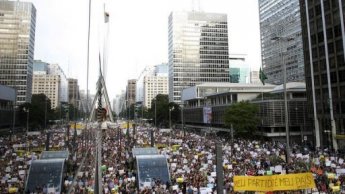www.aljazeerah.info
News, June 2013
Archives
Mission & Name
Conflict Terminology
Editorials
Gaza Holocaust
Gulf War
Isdood
Islam
News
News Photos
Opinion Editorials
US Foreign Policy (Dr. El-Najjar's Articles)
www.aljazeerah.info
|
Editorial Note: The following news reports are summaries from original sources. They may also include corrections of Arabic names and political terminology. Comments are in parentheses. |
Brazilians Continue Spending on Sports While Neglecting the Poor
Call for Brazil referendum meets resistance
President Dilma Rousseff has tried to quell protests with a call for ambitious political reforms, including a referendum on amending Brazil's constitution – a controversial move that already faces opposition from some lawmakers and jurists.
Opposition lawmakers and prominent judges and lawyers swiftly rejected President Dilma Rousseff’s call for a referendum on amending Brazil's constitution on Monday, while smaller protests against corruption, rising living costs and inadequate public services continued throughout the country.
Rousseff, who hails from the left-wing Workers Party, has tried to calm a huge wave of unrest that swept across the South American country last week, bringing out 1 million protesters at its peak on Thursday.
In meetings with protest leaders and with state governors Monday she unveiled plans for billions of dollars in new public spending, stiffer penalties for corruption, and a national vote that could lead to a new constitution – a move that may appease protesters, but which immediately met resistance from some groups.
“Why call a constituent assembly when only a political reform is needed? A constitutional reform could be contaminated by other issues that are not beneficial for Brazil,” the conservative senator José Agripino Maia told Agencia Brasil news agency.
Rousseff ‘deflecting cricitism’
Only lawmakers are allowed to call for a national referendum in Brazil, and some MPs blasted Rousseff for trying to lay blame on them amid the surge of popular discontent.
“[Rousseff] is trying to shift the attention off her, transferring her responsibility to Congress. In the same way she is transferring responsibility to states and cities to further lower fares of public transport,” said Aecio Neves, another senator from the main PSDB opposition party.
Top jurists and legal experts also questioned the wisdom of Rousseff’s proposed referendum.
Carlos Velloso, a former head of Brazil’s Supreme Federal Court, the equivalent of the Supreme Court in the United States, labelled the move “preposterous,” adding that there was no legal precedent for the kind of constitutional overhaul proposed by Rousseff.
“It’s a measure to fool the population that is demanding reform… the policy changes could be attained by a constitutional amendment,” Velloso told the online Jornal do Brasil daily.
Marcus Furtado, president of the Bar Association of Brazil (OAB), also said he was against calling a referendum on the constitution, telling the Estado de Sao Paulo newspaper that such an initiative “would waste a lot of energy on something that can be resolved without having to change the constitution.”
However, the head of the OAB chapter in the state of Sao Paulo, Marcos da Costa, said he backed Rousseff’s initiative.
Smaller protests continue
Meanwhile, protests on a smaller scale than those witnessed last week returned to some of Brazil’s cities on Monday.
In Rio de Janeiro, Brazilian dentists led a brief but noisy march behind a banner that read “public health should not be a business.”
Monday also saw 10,000 protesters in the southern city of Porto Alegre, 2,000 outside the state parliament in the northern city of Sao Luis, and 3,000 in the northern city of Belem, with a few scuffles with police and arrests reported.
Leaders of the Free Fare Movement that launched the protests more than a week ago said Rousseff was “unprepared” on the subject of public transport after a meeting with the president on Monday.
The group, which has been active for several years and calls for free public transport, said the president failed to provide details about how the 50 billion reais (€17 billion) she announced for improving public transport would be spent and promised to “continue the fight.”
Students in Rio de Janeiro were meeting on Tuesday to decide what protest actions could be taken in this final week of the Confederations Cup in Brazil.
Fresh protests in Brazil despite promise of reforms

Demonstrations continued in cities and towns across Brazil on Saturday despite President Dilma Rousseff’s attempts to placate protesters by unveiling a series of reforms to improve public services and fight against corruption.
Fresh protests rocked Brazil Saturday despite conciliatory remarks by President Dilma Rousseff, who pledged to improve public services and fight harder against corruption.
Rousseff's televised address late Friday appeared to have failed to sway protesters, as activists vowed to continue the struggle and ordinarily football-mad Brazilians once again protested outside Confederations Cup games.
More than 70,000 people chanting "The Cup for whom?" rallied in the southeastern city of Belo Horizonte as Mexico edged Japan 2-1 in the football tournament seen as a dress rehearsal for next year's World Cup.
Police fired tear gas when some of the protesters hurled stones and tried to break through the security perimeter around the Mineirao stadium. Some 25 people, including five police officers, were reported injured in the clashes, and another 22 protesters were arrested.
Later, the unrest spread as shops were looted, and banks and a car dealership vandalized.
"We are against the World Cup because it masks the problems the country faces," said musician Leonardo Melo, who dismissed Rousseff's speech as "rhetoric."
Over the past two weeks, hundreds of thousands of Brazilians have protested against the billions of dollars being spent on the World Cup, accusing the government of wasting money and neglecting health, education and transport.
More than a million marched in scores of cities on Thursday.
In Sao Paulo, 35,000 people took to the streets peacefully Saturday to denounce a proposed constitutional amendment that would take away the power of independent public prosecutors to probe crimes, making it harder to combat corruption.
In the southern town of Uruguaiana, demonstrators peacefully occupied the bridge linking Brazil to Uruguay for four hours.
In the university town of Santa Maria, where a disco fire killed 242 young people in January, 30,000 people protested.
In Salvador, where Brazil beat Italy 4-2 in another Confederations Cup match, demonstrators totaled about 200 people, according to an AFP reporter.
Inside the stadium, dozens of fans brandished placards proclaiming: "Let's go to the streets to change Brazil."
West of Rio, near the Bangu prison, police confiscated Molotov cocktails, sticks and stones and arrested 30 people for looting shops and smashing furniture on the heels of a protest by around 500 people, according to the Globo G1 website.
As the Rousseff government tried to address the ever rising tide of dissatisfaction over its social policies, former football star-turned Socialist politician Romario joined the debate, praising the demonstrators and dubbing world football body FIFA "Brazil's real president."
In her address, Rousseff offered Brazilians a "great pact" between the government and the people to improve shoddy public services and stressed the need for "more effective ways to fight corruption."
But her intervention left the protesters unmoved, judging by a torrent of comments on social media websites amid the release of a new poll showing that three-quarters of Brazilians back the demonstrations.
"I was depressed listening to Dilma. It's a joke, right? Dilma treats us as if we are idiots," read one typical comment.
"We want dates and times, action. Promises are not enough," wrote another.
The protests have been largely peaceful, but some have been marred by violence and acts of vandalism, notably in Rio and Brasilia, with two deaths recorded so far.
The popular outrage, dubbed by some a "Tropical Spring" after the protest movements in the Arab world and echoing similar turmoil in Turkey this month, has come as a shock to outside observers.
The unrest even led Hollywood A-lister Brad Pitt to scrap a plan to come to Brazil to promote his new film "World War Z," the movie's distributors said Saturday.
Rousseff's predecessor and political mentor Luiz Inacio Lula da Silva left office in 2010 with a soaring 80 percent approval rating, and the social policies he initiated are credited with lifting 40 million Brazilians out of poverty.
Lula also helped raise Brazil's international profile, and the World Cup was seen as a key milestone in its emergence as a global power player after several years of steady economic growth.
But despite the nationwide obsession with football, the protesters say they feel left behind as they watch gleaming new stadiums spring up in cities paralyzed by traffic jams and clogged with aging trains and buses.
(AFP)
Fair Use Notice
This site contains copyrighted material the
use of which has not always been specifically authorized by the copyright
owner. We are making such material available in our efforts to advance
understanding of environmental, political, human rights, economic,
democracy, scientific, and social justice issues, etc. We believe this
constitutes a 'fair use' of any such copyrighted material as provided for
in section 107 of the US Copyright Law. In accordance with Title 17 U.S.C.
Section 107, the material on this site is
distributed without profit to those
who have expressed a prior interest in receiving the included information
for research and educational purposes. For more information go to: http://www.law.cornell.edu/uscode/17/107.shtml.
If you wish to use copyrighted material from this site for purposes of
your own that go beyond 'fair use', you must obtain permission from the
copyright owner.
|
|
|
|
||
|
||||||



